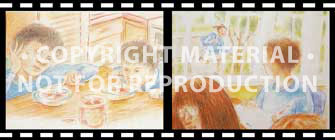|
||||||||||
|
|||||||||||
Questions/instructions:
|
|||||||||||
|
%
responses 2006 ('02) |
||||||||||
| y4 |
y8
|
||||||||||
| 1. What do you think happened with Anna and her mother after Anna’s brother left for school? |
|||||||||||
Anna kept her mouth shut, refused
to eat porridge |
24 (23) |
34 (38) |
|||||||||
Mum kept trying to get Anna to
eat porridge |
22 (20) |
23 (21) |
|||||||||
Anna won in end |
32 (13) |
50 (23) |
|||||||||
| 2. What do you think might have been written in the note that Anna was carrying? |
|||||||||||
apology for Anna being late |
41 (46) |
39 (52) |
|||||||||
explanation/excuse for Anna being late |
54 (51) |
69 (68) |
|||||||||
| 3. Why do you think they haven’t had porridge since then? |
|||||||||||
Mum decided it was too much hassle |
47 (25) |
61 (42) |
|||||||||
Mum doesn’t want to upset
Anna so much |
7 (7) |
12 (7) |
|||||||||
Total
score: |
4–7 |
18 (13) |
31 (25) |
||||||||
3 |
27 (18) |
35 (22) |
|||||||||
2 |
25 (25) |
20 (27) |
|||||||||
1 |
19 (25) |
10 (19) |
|||||||||
0 |
12 (19) |
5 (7) |
|||||||||
| Subgroup Analysis: |
Year 4 |
||
Year 8 |
| Commentary: |
| Most students in years 4 and 8 were able to give at least one good response to each of the questions posed requiring that an inference or prediction be made about the story. Some students were able to elaborate on their responses, indicating a richer understanding of the events. Pakeha students scored higher than Mäori or Pasifika students; gender differences were small, slightly favouring girls. Solid growth was seen on this task from year 4 to year 8. Both year 4 and year 8 students scored a little higher in 2006 than in 2002. |
